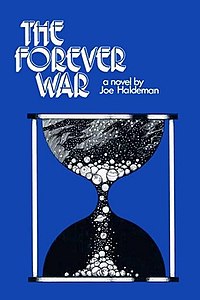

Images from Wikipedia.com.
Joe Haldeman's The Forever War and Heinlein's The Starship Troopers are both classics of military science fiction, but very different from each other, almost opposites. It's a good pair to compare and contrast.
I enjoyed both books. I've read so many novels I had to force myself to finish recently that I had almost forgotten what it's like to get really caught up in a book. Both of these have a captivating plot, interesting characters, and plenty of action, and I read them in one go. Especially The Forever War has the kind of immersion you long for, the kind that lets the world fall away and lets you jump into someone else's skin.
(Spoilers from here on, if you haven't read the books.)
I finished The Forever War first, and it might have affected the way I read Starship Troopers. The Forever War draws on the author's own experiences of the Vietnam war, and it explores the horrors of war, the need for warfare, and the problems of a soldier returning to civilian life. But there's also the science fiction themes of how the distances and the time dilation effect affect the main character as the world around him changes. The war in the book spans hundreds of years, and in the end the whole thing proves futile, so I felt the book had an anti-war message. There's also some not-so-subtle digs at army procedure, like the proper way to respond when someone says "attention." (Fuck you, sir!)
The main character, William Mandella, is a reluctant conscript, the son of hippie parents, and even his last name is a misspelling of "mandala." We follow his journey from recruit to soldier to a brief stint as a civilian. This book doesn't pull any punches; war is hell and people die. You feel every loss.
Haldeman's world-building is inspired. I especially enjoyed the soldiers' training on Charon. I don't know if the science was accurate (probably, because Haldeman has a degree in astronomy and physics), but it felt real and I believed it, and that's all you need. The Taurans were well realized, too. Properly alien.
So I had just finished this amazing anti-war book, and then picked up The Starship Troopers. Oh boy, does Heinlein open with action. The first scene is like an action movie sequence with a lot of blowing things up. The hero, Juan Rico, volunteers, and any volunteer can quit the armed forces any time he/she wants. In Heinlein's world, you can only become a full-fledged citizen by serving in the military. Then you get the right to vote when you finish.
Much like in The Forever War, we follow the main character's way from recruit to soldier to officer, but here the message is patriotism, struggling to overcome obstacles, and the responsibility that comes with power. There are long scenes exploring military science and theory and the necessity of having a strong military. Evolution is a theme, as in survival of the fittest, eat or be eaten. So even if mankind could outgrow war, some outer threat (like the inhuman Bugs in the book) would destroy us if we couldn't defend ourselves. As a Finn, I do get where Heinlein is coming from. (Just look up The Winter War.)
I did like the writing and the world-building here also. This is a very exciting book, almost unputdownable, but some bits were a bit hard to read, like the scene at school advocating corporal punishment for children to keep them from becoming juvenile delinquents. I'd also have liked to see more women. (Okay, there were a few, but mostly they were portrayed as the reason the soldiers fight. Why not show Carmen kicking ass, too?) The book was published in 1959, so I'll cut it some slack.
All in all, a lot of food for thought, and The Forever War is going on my "favourite books of all time" list. I actually forgot to read as a writer, because I was busy enjoying myself. Hmm... Maybe on the next read-through?
I'll certainly be reading more from Haldeman and Heinlein in the future.
No comments:
Post a Comment
Hello, stranger. What's on your mind?